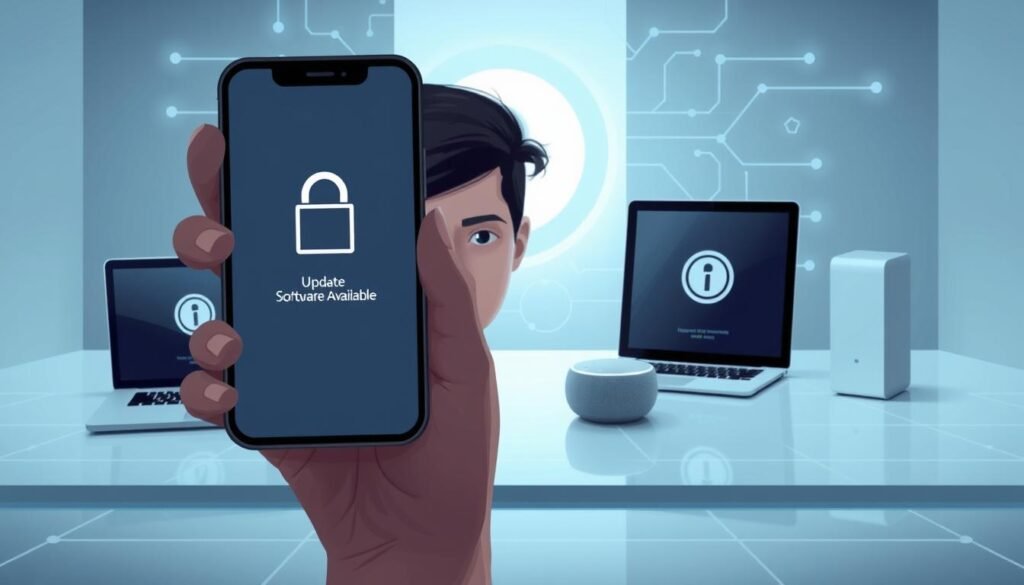Identity theft has affected 1 in 5 Americans, underscoring the critical need for effective privacy protection in the digital era. The surge in cyber threats and data breaches necessitates proactive measures to safeguard personal information. Utilizing online privacy tips is imperative. You can discover valuable tips to protect your privacy and learn how to employ strong passwords, activate two-factor authentication, and manage your social media presence. These actions can significantly diminish the risk of personal data exposure.
Key Takeaways
- Protecting your online privacy is crucial in today’s digital age
- Using strong passwords and enabling two-factor authentication can significantly reduce the risk of data breaches
- Being mindful of your social media presence is essential for safeguarding your personal information
- Staying informed about the latest online privacy tips and trends is vital for protecting your digital privacy
- Following tips to protect your privacy can help prevent identity theft and other cyber threats
Understand the Importance of Online Privacy
Online privacy is a cornerstone of our digital existence, demanding our full attention in today’s world. The surge in cyber threats and data breaches underscores the need for robust protection of our personal data. Data privacy measures are indispensable in thwarting the misuse or theft of our information.
Adopting privacy protection strategies is imperative to shield our online presence. This entails a cautious approach to the information we share online, the use of robust passwords, and the regular update of our software.
What is Online Privacy?
Online privacy encompasses the safeguarding of our personal data while navigating the internet. It involves the protection of our browsing history, search queries, and any data submitted to websites or online forms.
Why It Matters in Today’s Digital Age
In the current digital era, online privacy is more critical than ever. The proliferation of social media, online shopping, and digital banking has heightened the vulnerability of our personal information. By implementing measures to safeguard our online privacy, we can effectively deter identity theft, financial fraud, and other cyber crimes.
Use Strong Passwords and Change Them Regularly
In today’s digital landscape, safeguarding your online identity is paramount. Utilizing robust passwords and updating them frequently is a cornerstone of internet privacy best practices. It is also a critical measure in safeguarding personal information. A password deemed strong should exceed 12 characters, combining uppercase and lowercase letters, numbers, and special characters.
Adopting strong passwords is vital for internet privacy best practices as it acts as a bulwark against unauthorized access to your digital accounts. To optimize this strategy, consider the following attributes of a formidable password:
Characteristics of a Strong Password
- At least 12 characters long
- Mix of uppercase and lowercase letters
- Inclusion of numbers and special characters
Alongside the use of strong passwords, it is imperative to update them regularly, ideally every 60-90 days. Password management tools can facilitate this process, generating and storing intricate, unique passwords for each of your online profiles. This approach significantly enhances safeguarding personal information.
Tools for Password Management
Multiple password management tools are available, designed to assist in creating and storing formidable passwords. These tools also notify you when it’s time to update your passwords. This makes adhering to internet privacy best practices and protecting your online presence more manageable.
Enable Two-Factor Authentication for Extra Security
Two-factor authentication is a critical measure to safeguard your online presence. Adhering to privacy security tips can drastically lower the likelihood of account breaches. Implementing two-factor authentication introduces an additional safeguard, necessitating a second verification step beyond your password.
This second verification can take the form of a code sent to your mobile device or a biometric scan. To initiate two-factor authentication, simply follow the guidelines offered by the platform or service you are accessing. Alternately, you can leverage a third-party authentication application. This action fortifies your online accounts with cutting-edge privacy protection advice.
Benefits of Two-Factor Authentication
- Reduced risk of account hacking
- Additional layer of security
- Protection of sensitive information
Enabling two-factor authentication brings about enhanced security and tranquility. It is imperative to consistently adhere to privacy security tips to maintain a secure digital environment.
Be Mindful of Your Social Media Presence
Understanding the importance of online privacy tips is paramount. Your social media profiles are a repository of personal data, making them a prime target for cybercriminals. They can exploit this information to steal your identity or launch phishing attacks. To safeguard your digital privacy tips, it’s imperative to tweak your social media privacy settings. Also, be judicious about the personal details you disclose.
For further insights, visit Norton’s blog on safeguarding your privacy on social media. Implementing these measures can drastically lower the risk of divulging too much personal information. This, in turn, fortifies your online privacy.
Consider these critical points:
- Be cautious when interacting with strangers online
- Limit the amount of personal information you share on social media
- Adjust your social media privacy settings to control who can see your information
By adhering to these online privacy tips and being vigilant about your social media activities, you can bolster your digital privacy tips. This approach ensures a safer online environment for you.
Secure Your Internet Connection
To safeguard your online privacy, securing your internet connection is paramount. This necessitates the adoption of robust data privacy measures. Utilizing a virtual private network (VPN) is a fundamental step when accessing the internet. A VPN encrypts your internet traffic, thwarting hackers’ attempts to intercept your data.
Protecting your Wi-Fi network is equally vital. Achieve this by employing a robust password and activating WPA2 encryption. These actions significantly diminish the likelihood of your personal data falling into the wrong hands. Key considerations for securing your internet connection include:
- Choosing a reputable VPN provider
- Enabling WPA2 encryption on your Wi-Fi network
- Regularly updating your router’s firmware
Adopting these data privacy measures ensures a secure internet connection and shields your online privacy.
Be cautious of public Wi-Fi networks, as they can be a significant threat to your online security. By taking the necessary precautions and implementing effective data privacy measures, you can enjoy a secure and private online experience.
Regularly Update Your Software and Devices

In today’s digital landscape, adhering to internet privacy best practices is paramount. A critical step in protecting personal data is to regularly update software and devices. This action fortifies defenses against cyber threats by addressing vulnerabilities that hackers might exploit. By keeping your systems current, you significantly lower the risk of data breaches.
Enabling automatic updates is a practical strategy to maintain the latest versions of your devices and software. Antivirus software and a firewall can further bolster your defenses against malware and other cyber dangers. For detailed guidance on enabling automatic updates, refer to the University of Idaho’s support page or explore proven cybersecurity best practices.
Regular updates offer several advantages:
- Enhanced security
- Improved performance
- New features and functionality
By prioritizing internet privacy best practices, such as regular updates, you enhance your personal data’s security and shield yourself from cyber threats. Staying informed and being proactive are crucial for maintaining your online safety.
Be Cautious with Public Wi-Fi Networks
Utilizing public Wi-Fi networks necessitates a heightened focus on online privacy and security. These networks pose a considerable threat to personal data, given their inherent lack of security and susceptibility to hacking. Adhering to privacy security tips and leveraging privacy protection advice is imperative to safeguard your digital footprint.
Dangers of Using Public Wi-Fi
Engagement with public Wi-Fi networks exposes your personal data to potential interception by hackers. This vulnerability encompasses sensitive information such as passwords, credit card numbers, and confidential data. To mitigate this risk, it is advisable to refrain from accessing sensitive information over public Wi-Fi networks.
Tips for Staying Safe on Public Networks
To ensure safety on public networks, adhere to these guidelines:
- Employ a virtual private network (VPN) to encrypt your internet traffic
- Steer clear of accessing sensitive information, such as online banking or email
- Ensure your devices and software are current with the latest security patches
By adhering to these privacy security tips and utilizing privacy protection advice, you can effectively diminish the risk of personal data compromise on public Wi-Fi networks.
Know Your Rights Regarding Data Privacy

In today’s digital landscape, understanding your data privacy rights is paramount. As you explore the online realm, it’s vital to grasp the laws governing data privacy and their implications for you. This awareness empowers you to safeguard your personal data and thwart potential misuse. By adhering to online privacy tips and digital privacy tips, you can make more informed choices about sharing your personal details online.
In the United States, several laws dictate data privacy, with the California Consumer Privacy Act (CCPA) being a notable example. To safeguard your data rights, consider the following:
- Review the privacy policies of websites and apps before sharing your personal information
- Use strong passwords and enable two-factor authentication to secure your online accounts
- Be cautious when sharing personal information on social media platforms
By implementing these measures and staying abreast of online privacy tips and digital privacy tips, you can effectively protect your data rights. Remember, prioritizing your online privacy is essential. Take proactive steps to secure your digital footprint.
Stay Informed About Privacy Threats and Trends
As technology advances, staying abreast of privacy threats and trends becomes crucial. Following sources like the Electronic Frontier Foundation and the Federal Trade Commission keeps you updated on online security developments. This knowledge empowers you to make informed choices about your online activities, safeguarding your personal data.
Following Reputable Sources
It’s essential to follow reputable sources to stay informed about privacy issues. These entities offer critical insights into protecting your privacy and implementing effective strategies. By doing so, you cultivate habits and practices that significantly lower the risk of data breaches.
Continuous Learning
In today’s digital landscape, continuous learning about online security is paramount. By staying informed and proactively protecting your online privacy, you can ensure a safer digital experience. Remember, safeguarding your online privacy is an ongoing endeavor that demands dedication and vigilance. With the right strategies and knowledge, you can effectively mitigate risks and maintain your online safety.
